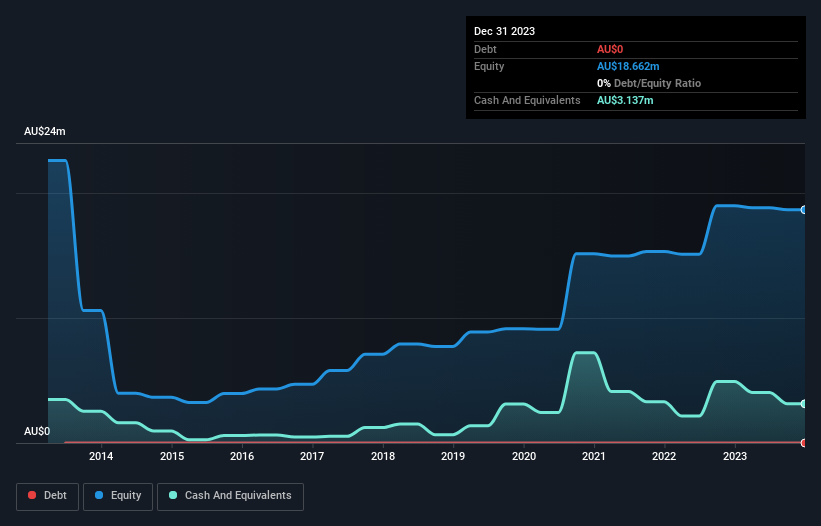Just because a business does not make any money, does not mean that the stock will go down. For example, although Amazon.com made losses for many years after listing, if you had bought and held the shares since 1999, you would have made a fortune. But while the successes are well known, investors should not ignore the very many unprofitable companies that simply burn through all their cash and collapse.
So should Marmota (ASX:MEU) shareholders be worried about its cash burn? For the purposes of this article, cash burn is the annual rate at which an unprofitable company spends cash to fund its growth; its negative free cash flow. We'll start by comparing its cash burn with its cash reserves in order to calculate its cash runway.
See our latest analysis for Marmota
How Long Is Marmota's Cash Runway?
A company's cash runway is calculated by dividing its cash hoard by its cash burn. When Marmota last reported its December 2023 balance sheet in March 2024, it had zero debt and cash worth AU$3.1m. Looking at the last year, the company burnt through AU$1.7m. That means it had a cash runway of around 22 months as of December 2023. That's not too bad, but it's fair to say the end of the cash runway is in sight, unless cash burn reduces drastically. We should note, however, that if we extrapolate recent trends in its cash burn, then its cash runway would get a lot longer. Depicted below, you can see how its cash holdings have changed over time.

How Is Marmota's Cash Burn Changing Over Time?
While Marmota did record statutory revenue of AU$30k over the last year, it didn't have any revenue from operations. To us, that makes it a pre-revenue company, so we'll look to its cash burn trajectory as an assessment of its cash burn situation. Even though it doesn't get us excited, the 29% reduction in cash burn year on year does suggest the company can continue operating for quite some time. Marmota makes us a little nervous due to its lack of substantial operating revenue. So we'd generally prefer stocks from this list of stocks that have analysts forecasting growth.
How Easily Can Marmota Raise Cash?
Even though it has reduced its cash burn recently, shareholders should still consider how easy it would be for Marmota to raise more cash in the future. Issuing new shares, or taking on debt, are the most common ways for a listed company to raise more money for its business. Commonly, a business will sell new shares in itself to raise cash and drive growth. We can compare a company's cash burn to its market capitalisation to get a sense for how many new shares a company would have to issue to fund one year's operations.
Marmota has a market capitalisation of AU$52m and burnt through AU$1.7m last year, which is 3.3% of the company's market value. That's a low proportion, so we figure the company would be able to raise more cash to fund growth, with a little dilution, or even to simply borrow some money.
Is Marmota's Cash Burn A Worry?
As you can probably tell by now, we're not too worried about Marmota's cash burn. In particular, we think its cash burn relative to its market cap stands out as evidence that the company is well on top of its spending. And even though its cash burn reduction wasn't quite as impressive, it was still a positive. Considering all the factors discussed in this article, we're not overly concerned about the company's cash burn, although we do think shareholders should keep an eye on how it develops. Separately, we looked at different risks affecting the company and spotted 2 warning signs for Marmota (of which 1 doesn't sit too well with us!) you should know about.
Of course Marmota may not be the best stock to buy. So you may wish to see this free collection of companies boasting high return on equity, or this list of stocks that insiders are buying.
New: Manage All Your Stock Portfolios in One Place
We've created the ultimate portfolio companion for stock investors, and it's free.
• Connect an unlimited number of Portfolios and see your total in one currency
• Be alerted to new Warning Signs or Risks via email or mobile
• Track the Fair Value of your stocks
Have feedback on this article? Concerned about the content? Get in touch with us directly. Alternatively, email editorial-team (at) simplywallst.com.
This article by Simply Wall St is general in nature. We provide commentary based on historical data and analyst forecasts only using an unbiased methodology and our articles are not intended to be financial advice. It does not constitute a recommendation to buy or sell any stock, and does not take account of your objectives, or your financial situation. We aim to bring you long-term focused analysis driven by fundamental data. Note that our analysis may not factor in the latest price-sensitive company announcements or qualitative material. Simply Wall St has no position in any stocks mentioned.
About ASX:MEU
Flawless balance sheet with low risk.
Market Insights
Community Narratives



